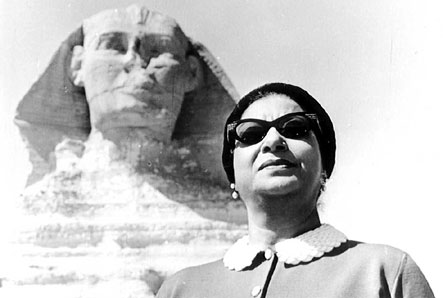Toby Ash serves up a mezze of Middle Eastern musical delights…
There is only one starting point to any post on Arab music and that’s Egypt and the ‘Star of the East’ Umm Kulthum, who is widely lauded as the greatest Arab singer of the twentieth century.
Born the daughter of an Imam in the Nile Delta in about 1900, her talent was spotted early and she became member of travelling performing troupe as a child. In 1923 she had moved to Cairo and began working with the leading song writers and composers of the day. However, her heyday really came in the 1950s, when she seemed to personify the vitality and confidence that swept Egypt after the nationalists took power in 1952. The streets were empty during her monthly radio broadcasts and she endeared herself to the masses by performing regularly in public.
The theme of Umm Kulthum’s recitals were usually the three Ls – love, loss and longing – and could go on for many hours. Her voice was remarkably powerful (look how far she stands away from the microphone) and she forged an extraordinary emotional relationship with her audience by repeating lines or tweaking the intensity of certain phrases to create an almost euphoric reaction. Her funeral in 1975 was attended by more than four million people, the second largest funeral in Egyptian history after that of President Gamal Abdel Nasser.
The current Grande Dame of Arab music is Fairuz, a Lebanese singer who started performing in the late 1950s and remains one the most widely recognised Arab singers outside of the Middle East. Like Umm Kulthum before her, she has carefully nurtured her popular appeal, famously being banned from Lebanese radio for 6 months for refusing to sing at a private concert for the Algerian president in 1969 saying she would only ever sing to her public and never to an individual.
While Umm Kulthum’s heyday was during a period of optimism in the Arab world, Fairuz’s was in the 1970s and 1980s, in the aftermath of the Arab humiliation in the 1967 war with Israel and during the Lebanese civil war. One of her most famous songs is ‘Le Beirut’ which mourns the loss and destruction in the city of her birth. It is a powerful and emotional lament, especially for those Lebanese who were forced to flee the country.
When I lived in London, there was a wonderful Lebanese restaurant close to my flat that I visited regularly. The owner was a sweet, middle-aged Lebanese Christian whose eyes would well-up every time she heard ‘Le Beirut’. The war had forced her out of the country, and now she was alone in London with only her memories. Of course any mention of Muslims and Palestinians sent her off into a rage (‘it’s all their fault’) and she was also a big supporter of a convicted murderer who stood in the last presidential election (‘he comes from my village’), but apart from all that she was a lovely, gentle soul. Just don’t give her an AK-47.
Now for something altogether a bit racier. While the Arab street is becoming more conservative, Arab popular music is seemingly heading in the opposite direction. There a number of female pop acts in the region who are now major celebrities and are often clashing with religious authorities over their revealing clothes and suggestive dance moves; none more so than Haifa Wehbe, a Lebanese Shia Muslim and a former Miss South Lebanon. When I hear the words Lebanese Shia on the news, I now prefer to conjure up an image of the lovely Haifa rather than some Katyusha-firing Hezbollah holy warrior.
However, after much deliberation I have opted to serve up this morning a little helping of Nancy Ajram who is, quite simply, the beginning, middle and end of Arab pop raunch. As you will see from the video, this Maronite heart-breaker also has her own very particular take on rural Lebanese life. Do watch out for the dive-bombing chickens.
My final selection is by the Algerian singer-songwriter Khaled. He is the undisputed King of Rai, a combination of Arab, French and Spanish folk music traditions which came out of the Algerian port city of Oran in the 1930s.
Khaled is best known for his 1992 song Didi, which became the first Arab song ever to enter the French top 10. He also sang it during the open ceremony of the 2010 World Cup in South Africa. However, today I have opted to share his track Aicha which is sung mostly in French (a single verse is in Arabic) and topped the French chart on its release in 1996. Enjoy the cartwheels and the monkey.











